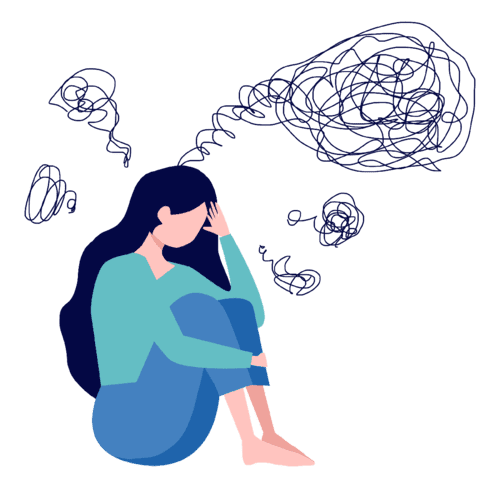Suicidal OCD Assessment
Free Suicidal OCD Assessment

What is Suicidal OCD Assessment?
Suicidal OCD, also known as “Suicide Obsessions,” is a subtype of Obsessive-Compulsive Disorder (OCD). It involves intrusive and distressing thoughts, images, or impulses related to self-harm or suicide. Individuals with this condition experience overwhelming anxiety and engage in compulsive behaviors to alleviate their distress, such as seeking reassurance or avoiding triggering situations. Despite having no genuine desire to harm themselves, they are tormented by the fear that they might act on these thoughts. Proper assessment involves evaluating the frequency, intensity, and impact of these obsessions, as well as identifying any co-occurring conditions like depression. Treatment typically includes Cognitive Behavioral Therapy (CBT) and, in some cases, medication.
Who can benefit from this Suicidal OCD Assessment?
The Suicidal OCD Assessment can benefit individuals struggling with intrusive, distressing thoughts of self-harm or suicide. This includes those diagnosed with obsessive-compulsive disorder (OCD) that centers around suicidal themes. It provides a structured framework to assess the severity of these thoughts, aiding mental health professionals in tailoring appropriate interventions. Additionally, loved ones and caregivers seeking to understand and support individuals with Suicidal OCD can gain insight from this assessment. By identifying risk levels and offering guidance, this assessment can contribute to early intervention and effective management of the condition, fostering improved mental well-being and preventing potential harm.
Suicidal OCD Assessment Accuracy
Suicidal OCD, a subtype of Obsessive-Compulsive Disorder (OCD), involves distressing intrusive thoughts related to self-harm or suicide. Individuals with this condition experience intense anxiety but are not actually at risk of acting on these thoughts. It’s crucial to differentiate between genuine suicidal ideation and OCD-related thoughts. Mental health professionals can accurately assess this distinction through thorough evaluation and understanding of the individual’s history, symptoms, and context. While assessment accuracy is generally high, a comprehensive approach that combines clinical expertise, patient input, and potentially psychological assessments ensures the most precise diagnosis and appropriate intervention.
Types of Suicidal OCD Assessment
Clinical Interview:
A mental health professional, such as a psychiatrist or psychologist, will conduct a thorough interview to gather information about the person’s thoughts, emotions, behaviors, and history. This interview will likely cover the nature of the obsessions and compulsions, as well as any suicidal thoughts or tendencies.
Diagnostic Criteria:
The mental health professional will assess whether the individual meets the diagnostic criteria for OCD as outlined in the Diagnostic and Statistical Manual of Mental Disorders (DSM-5). Suicidal thoughts, if present, will also be considered and evaluated.
Severity of Suicidal Thoughts:
The clinician will assess the severity and frequency of suicidal thoughts. This might involve questions about the nature of these thoughts, whether they are passive or active, and any specific plans or intentions.
Safety Assessment:
Evaluating immediate safety is crucial when dealing with suicidal OCD. The mental health professional will assess whether there is an imminent risk of harm to oneself and may decide on appropriate interventions or hospitalization if needed.
Co-Existing Conditions:
Other mental health conditions often coexist with OCD, such as depression, anxiety disorders, and other mood disorders. It’s important to assess these conditions as they can influence the severity and treatment approach.
Functional Impairment:
The extent to which OCD and any associated suicidal thoughts are impacting the individual’s daily life, relationships, and overall functioning will also be assessed.
Handling Suicidal OCD Issues
However, if you or someone you know is struggling with suicidal thoughts, it’s important to seek help from a qualified mental health professional or a counselor immediately. Here are some steps you might consider:
- Seek Professional Help: Reach out to a mental health professional, such as a therapist, psychiatrist, or counselor who has experience with OCD and suicidal ideation. They can provide you with appropriate guidance and treatment options.
- Safety First: If you believe you or someone else is in immediate danger, don’t hesitate to call emergency services or a suicide hotline. In the US, you can call the National Suicide Prevention Lifeline at 1-800-273-TALK (1-800-273-8255).
- Educate Yourself: Learn about OCD and its various forms, including suicidal OCD. Understanding the nature of the condition can help you better manage your symptoms and cope with distressing thoughts.
- Cognitive Behavioral Therapy (CBT): CBT, particularly Exposure and Response Prevention (ERP), is a common therapeutic approach for OCD. It involves gradually exposing yourself to anxiety-provoking situations and resisting the compulsions that typically follow. A trained therapist can guide you through this process.
- Medication: In some cases, medication may be prescribed by a psychiatrist to help manage the symptoms of OCD. This is typically done in conjunction with therapy.
- Support Groups: Connecting with others who are experiencing similar struggles can provide a sense of community and understanding. Consider joining support groups either online or in-person.
- Practice Self-Care: Engage in activities that help you relax and reduce stress. Regular exercise, meditation, mindfulness, and maintaining a balanced diet can contribute to your overall well-being.
- Stay Connected: Reach out to friends and family members who can offer emotional support. It’s important to communicate your feelings and thoughts with people you trust.
- Limit Exposure to Triggers: Minimize your exposure to triggers that exacerbate your OCD symptoms. This might involve avoiding certain situations, environments, or media content that triggers distress.
- Develop Safety Plans: Work with your therapist to create safety plans for managing intense moments of distress. These plans can include coping strategies and emergency contacts.
- Journaling: Writing down your thoughts and feelings can help you gain insight into your experiences and track your progress over time.
- Set Realistic Goals: Focus on small, achievable steps in your treatment journey. Celebrate your successes along the way.
Remember, it’s crucial to work with qualified mental health professionals who can tailor their advice to your specific situation. If you’re dealing with suicidal thoughts or urges, please prioritize seeking help from professionals who can provide you with the appropriate care and support.

